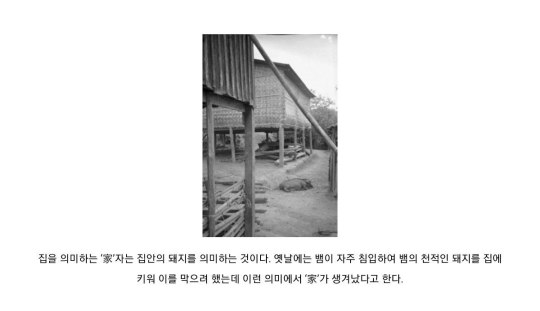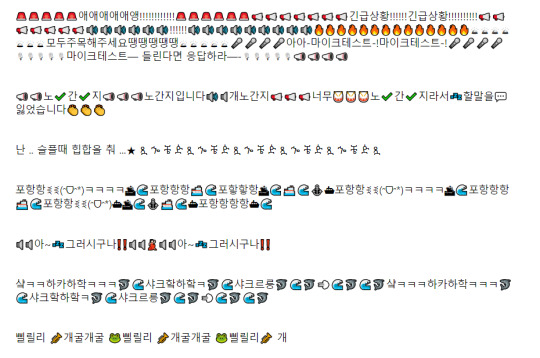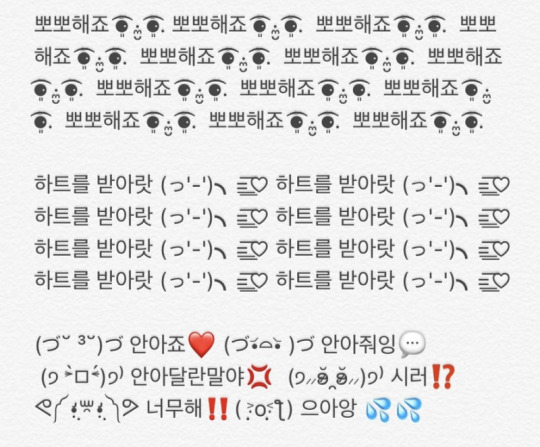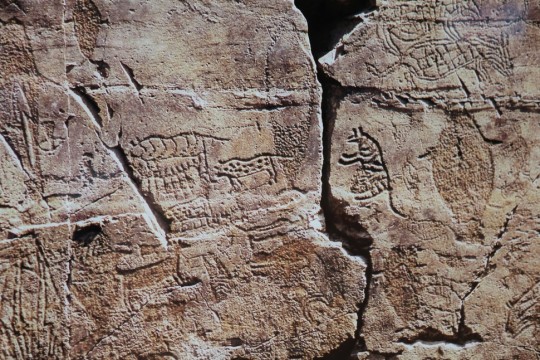a Korean language translator and collector of linguistic insights in Japanese and Mandarin
Don't wanna be here? Send us removal request.
Text
Word of the Day
I came across the expression 마가 끼다, which means "to be unlucky," and the word 마 seemed particularly interesting to me. The dictionary suggests the following meanings:
1. a strange obstacle that prevents things from going well.
2. a place or time where bad things often happen.
3. a barrier that’s hard to overcome.
4. a term referring to all strange and malevolent spirits.
5. (Buddhism) an evil spirit that takes over the minds of Buddhists, hindering practice and the path to enlightenment.
10 notes
·
View notes
Text
ART HISTORY WORD LIST [part 2]
구조 [構造] - structure
왕릉 [王陵] - royal tomb
계급 [階級] - class, rank
장식되다 [裝飾되다] - be decorated
정면 [正面] - facade front
분담하다 [分擔하다] - to share
설화 [說話] - tale
별자리 - star constellation
도교 [道敎] - Taoism
고분 벽화 [古墳壁畫] - tomb fresco
권위적 [權威的] - authoritative
천장 [天障] - ceiling
승려 [僧侶] - Buddhist monk
공양하다 [供養하다] - to offer food to Buddha
기상 [氣像] - spirit
배치하다 [排置하다] - to arrange
웅혼하다 [雄渾하다] - dynamic
원근감 [遠近感] - perspective
설채 [設彩] - to draw background with ink and then color it
씨름 - korean wrestling, ssireum
유래되다 [由來되다] - to originate
무예 [武藝] - martial arts
색채 [色彩] - tone (color)
내세 [來世] - afterlife
귀족 [貴族] - aristocracy
제왕 [帝王] - emperor
사신 [四神] - Four Symbols - four mythological creatures appearing among the Chinese constellations along the ecliptic, and viewed as the guardians of the four cardinal directions. These four creatures are also referred to by a variety of other names, including "Four Guardians", "Four Gods", and "Four Auspicious Beasts". They are the Azure Dragon of the East, the Vermilion Bird of the South, the White Tiger of the West, and the Black Tortoise of the North. Each of the creatures is most closely associated with a cardinal direction and a color, but also additionally represents other aspects, including a season of the year, an emotion, virtue, and one of the Chinese "five elements" (wood, fire, earth, metal, and water). Each has been given its own individual traits, origin story and a reason for being. Symbolically, and as part of spiritual and religious belief and meaning, these creatures have been culturally important across countries in the East Asian cultural sphere.
청룡 [靑龍] - Azure Dragon, Blue Dragon 백호 [白虎] - White Tiger 주작 [朱雀] - Vermilion Bird, Red Phoenix 현무 [玄武] - Black Tortoise

#korean#word list#korean vocabulary#korean language#langblr#learning languages#language study#foreign languages#language blog#korean word of the day#hangul#hanja#korean history#korean art#한국어#한국미술사
#korean#foreign languages#language study#korean word of the day#langblr#korean language#korean history#korean art#한국어#hanja#hangul#word list#한국미술사#korean culture
51 notes
·
View notes
Text
some korean vocab I learned from the random schedule

some new vocab for me that I encountered in this schedule of training camp for social workers.
성희롱 - sexual harassment
마음건강검사 - mental health examination
효과적인 의사소통 - effective communication
수료식 - completion ceremony
사회재난과 안전 - social disaster and safety
갈등대처 - conflict response
귀가 - return home
규율과 규정 - discipline and regulation
#korean#korean vocab#language learning#한국어#foreign languages#korean vocab list#korean langblr#language study#langblr#korean word of the day#language stuff#random vocab
22 notes
·
View notes
Text
I would say comedy genre has more verbs and action situations in general, so maybe look up these? my suggestions:
랑데뷰
인삼류
위아더좀비
월유메리미
신혼일기 (and other from the author)
대신 심부름을 해다오
하루땃따
드로잉 레시피
소소한 일상기록둔
좌충우둘 미대생존기
hope it helps!
does anyone know of some webtoons that would be good for learning Korean if you have a lot of random noun vocabulary but not a lot of grammar & verbs
4 notes
·
View notes
Text
231126 chinese journal log
我出去散步,外面正下着暴风雪。 时速约 50 公里。街上没有人。也看不到汽车。我走了一个小时,一路上没有看到任何人。一切看起来都像是后世界末日的景象。我只能听到呼啸声和脚下积雪的嘎吱声。我再次确信,冬天是我最喜欢的季节。
散步 - take a walk 暴风雪 - snowstorm 公里 - kilometer 街上 - on the street 一路上 - along the way 后世界末日 - post-apocalypse 景象 - scene 呼啸 - whistle 脚下 - under the foot 嘎吱 - crunch 再次 - once again 确信 - to be convinced 季节 - season
#chinese#chinese vocab#journal log#chinese language#chinese langblr#langblr#language study#language practice#it was actually hard to write#foreign languages#vocab
1 note
·
View note
Text
here’s an interesting internet word i just learned:
垢作る(あかつくる) = to make an account (on a website)
the use of 垢 is as an ateji from アカウントを作る! 💻🖱
473 notes
·
View notes
Text
Learning Chinese with Lyrics: 蔡健雅 (Tanya Chua) - 遺書
I recently started listening to more Chinese music and quite by accident found Tanya Chua and her amazing voice charmed me.
My favorite line of the song: 我曾愛過的都愛過了 - I've loved everything I've ever loved.
youtube
平常不過的夜晚
平常 ping2chang2 - ordinary
這是我最後一次給自己交代
確定沒留下任何遺憾
確定 que4ding4 - to ensure 留下 liu2xia4 - to leave behind 遺憾 yi2han4 - regret
沒有任何的不安跟未知對談
對談 dui4tan2 - to talk face to face
我曾愛過的都愛過了
曾看不開的或許不一定都要釋懷
釋懷 shi4huai2 - release (tension)
我也認真過了付出多過獲得
認真 ren4zhen1- to take seriously 付出 fu4chu1 - to invest energy in friendship
但願他們記得感動的每一刻
感動 - to touch sb emotionally
把留下的淚水藏不住的心碎
心碎 xin1sui4 - heartbroken
寫成歌給人安慰
我閉上眼睛唱著 感謝這一生沒白費
白費 bai2fei4 - to waste energy
世界��照樣運轉
只是我已出發在旅程另一段
走在人群中特別孤單
人群 ren2gun2 - crowd 孤單 gu1dan1 - lonely
這個錯誤的安排不需要重來
我曾愛過的都愛過了
曾看不開的或許不一定都要釋懷
我也認真過了付出多過獲得
但願他們記得感動的每一刻
把留下的淚水藏不住的心碎
寫成歌給人安慰
我閉上眼睛唱著 感謝這一生沒白費
我會留下什麼 請替我保管就別不捨得
保管 bao3guang3 - to guarantee
We’re gonna make it through
我是被疼愛的 我會好好的
得到你的祝福怎麼會不想哭
祝福 zhu4fu2 - blessings
我會去片大海無憂無慮去愛
無憂無慮 wu2you1wu2lu4- carefree and without worries
像塵埃自由自在
自由自在 zi4you2zi4zai4 - free and easy
在那一片大海告別了感慨
So GoodNight
Goodbye
#learning chinese with lyrics#cpop#chinese music#mandopop#chinese vocab#chinese language#langblr#chinese study#tanya chua#study mandarin#Youtube
4 notes
·
View notes
Text
I read a book about the history of hanok (traditional Korean housing) and find out that the word 집 (家, hanja is read as 가) literally means “family pig”. Apparently, in the past, snakes often invaded houses and owners tried to stop them by raising pigs, the natural enemies of snakes. From this meaning the word 가족(家族), which means “home” or “family”, was created.

3 notes
·
View notes
Text
korean slang [part 1]
문찐 - culture loser, someone who is not interested in or does not know much about pop culture, new trends.
short for 문화찐따 = 문화(culture) + 찐따 (loser).
사진빨 - being very photogenic.
from 사진발, from 사진 (寫眞, photo) + 발 (lines, streaks).
엔조이 - enjoyment, casual romantic relationship.
네덕 - selfish, immature, and conceited fan or poster.
short for 네이버 ("Naver", main South Korean search engine and platform) + 덕후 (otaku, fan), originally because such people were most common on Naver's general blogs, rather than on more specialized platforms.
수포자 - someone who has given up on studying math (in school).
contraction of 수학 포기자.
솔크 - Christmas without a romantic partner.
of 솔로 solo + Christmas. Christmas is considered a romantic holiday in South Korea.
읽씹 - leaving a text or message on read, and not reply.
안읽씹 - intentionally leaving a text or message on unread.
ㄴㅇㅎ - being incomprehensible.
마자마자 - truetrue, yesyes.
호구 - an overly naive and submissive person; pushover.
sino-korean word from 虎口, from 虎 (“tiger”) + 口 (“mouth”). The "pushover" sense derives from the game of Go sense, implying someone who would be submissive enough to be willing to place their stone in such a position.
현자타임/현타 - (vulgar) post-nut clarity or (non-vulgar) a moment when one realizes that what one is doing is actually pointless, reality check.
현자(賢者) + 타임, calque of Japanese 賢者タイム (“post-nut clarity”).
a non-vulgar reanalysis of the above as an abbreviation of 현실(現實) 자각(自覺) 타임 (“reality perception moment”). the new interpretation retains a metaphoric extension of the original meaning, but in a non-sexual way. many Koreans are not aware of the original etymology, and the word has appeared in TV programs for general audiences.
스포당하다 - to accidentally read spoilers (of a film, video game).
눈팅 - only read articles or posts without leaving any comment; lurking.
#korean#korean vocab#korean slang#korean word of the day#langblr#korea#internet slang#한국어#속어#language stuff
25 notes
·
View notes
Text
텍대 [internet slang]
it means "text replacement" and usually looks like this:


usage used to spam words and emoji at the same time effortlessly. not all 텍대 are the same, and not all of them are meant to be funny, but they are usually created for the sake of a joke. popular among k-pop fans.
etymology
short of 텍스트 대치, where 텍스트 (text) + 대치 (replacement)
16 notes
·
View notes
Text
Chinese idioms of the week
时时刻刻 [shíshíkèkè] - constantly; all the time
引经据典 [yǐnjīngjùdiǎn] - to quote the classical texts
胡说八道 [húshuōbādào] - to talk nonsense
乱七八糟 [luànqībāzāo] - in a complete mess; at sixes and sevens
不伦不类 [bùlúnbùlèi] - nondescript; neither fish nor fowl
不明不白 [bùmíngbùbái] - unclear, vague, for no reason
大喊大叫 [dàhǎndàjiào] - to scream loudly
日日夜夜 [rìrìyèyè] - day and night; day in, day out
哭哭啼啼 [kūkutítí] - to cry continuously
筋疲力尽 [jīnpílìjìn] - to be exhausted
下定决心 [xiàdìngjuéxīn] - to make a firm resolution
毫无疑问 [háowúyíwèn] - without a doubt; certainly
吞吞吐吐 [tūntūntǔtǔ] - to mutter and mumble
仅此而已 [[jǐncǐéryǐ] - just this and nothing more
一五一十 [yīwǔyīshí] - (of narrating) in full detail
井然有序 [jǐngrányǒuxù] - orderly; in apple-pie order
不好意思 [bùhǎoyìsi] - too embarrassed or shy to do something
无关紧要 [wúguānjǐnyào] - unimportant
日积月累 [rìjīyuèlěi] - to accumulate over a long period
事先通知 [shìxiāntōngzhī] - to announce in advance
夸夸其谈 [kuākuāqítán] - to boast; to talk big
All of these I encountered while reading the book <鞋带> by Domenico Starnone. It's a translation from Italian. I would recommend it for those who have an intermediate level. The language is quite simple and the sentences are short which is good for language learning. The overall story is also engaging.
#chengyu#chinese idioms#chinese#mandarin#idioms#language learning#language study#reading#chinese vocab#mandarin vocab#chinese langblr#foreign languages#languageblr
75 notes
·
View notes
Text
ART HISTORY WORD LIST
I'm slowly reading a book called 청소년을 위한 한국미술사 (Korean Art History for Youth). In the process I came across many interesting terms that may be useful for those who are interested in Korean art and history and maybe would like to read about such topics in Korean in the future. So I decided to share the vocabulary list. Perhaps, to be continued.
선사 [先史] - prehistory
도안 [圖案] - design
암각화 [巖刻畵] - petroglyphs
청동 [靑銅] - bronze
빗살무늬 토기 - comb-pattern pottery
유물 [遺物] - relic, artifact
미의식 [美意識] - aesthetic sense
창의력 [創意力] - creativity
삼국 시대 [三國時代] - Three Kingdoms of Korea
불교 [佛敎] - Buddhism
부처의 현신 [現身] - the Buddha who appeared in the form of a famine in order to save sentient beings
소재 [素材] - material
국교 [國敎] - established religion
강대국 [强大國] - (world) power, powerful nation
학술 [學術] - scholarship
석총 [石塚] - stone grave
석실봉토무덤 [石室封土무덤] - stone-filled tomb
기원전 [紀元前] - B.C. (Before Christ): 기원전 50년 - 50 B.C.
고고학 [考古學] - archaeology
묘제 [墓祭] - a memorial service held before the grave
전기 [前期] - the former part
평면도 - ground plan (architecture)
초상화 [肖像畵] - portrait
고분벽화 [古墳壁畫] - ancient tomb mural
사당 [祠堂] - shrine
신주 [神主] - ancestral tablet
경외감 [敬畏感] - sense of awe
환희 [歡喜] - (great) joy, delight
전달력 [傳達力]- transmission
구체적 [具體的] - detailed
기인하다 [起因하다] - result from
순수 [純粹] - purity
공예품 - handicraft, craftwork
문화재 [文化財] - cultural properties
보관 [保管] - storage
걸작 [傑作] - masterpiece
보고 [寶庫] - repository
청자 [靑瓷] - celadon
극치 [極致] - the height (of)
영토 [領土] - territory, domain
만주 [滿洲] - Manchuria
수나라 [隋나라] - Sui Dynasty
당나라 [唐나라] - Tang Dynasty
명장 [名將] - great commander
저항하다 [抵抗하다] - resist
패망하다 [敗亡하다] - collapse

#korean#word list#korean vocabulary#korean language#langblr#learning languages#language study#foreign languages#language blog#korean word of the day#hangul#hanja#korean history#korean art#한국어#한국미술사
92 notes
·
View notes